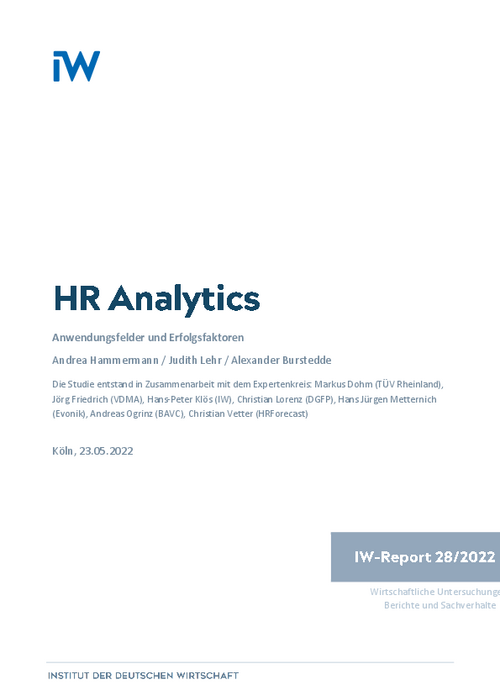In this study, the term HR analytics is used to describe data-based decision-making in HR, whereby the transitions from classic HR controlling to HR analytics, in which various data sources are combined to identify interdependencies and make predictions, are fluid. The study provides an overview of the potential of HR analytics and the success factors for its introduction and use.

HR Analytics: Fields of application and success factors
The study was produced in collaboration with the expert group: Markus Dohm (TÜV Rheinland), Jörg Friedrich (VDMA), Hans-Peter Klös (IW), Christian Lorenz (DGFP), Hans Jürgen Metternich (Evonik), Andreas Ogrinz (BAVC), Christian Vetter (HRForecast)

In this study, the term HR analytics is used to describe data-based decision-making in HR, whereby the transitions from classic HR controlling to HR analytics, in which various data sources are combined to identify interdependencies and make predictions, are fluid. The study provides an overview of the potential of HR analytics and the success factors for its introduction and use.
HR analytics has the potential for HR decisions of better quality, objectivity, and transparency, as well as time and cost savings through partial automation of processes. However, the results can only be as good as the data and analysis methods used. Careless use can lead to wrong decisions and statistical discrimination.
The potential of HR analytics is all the greater, the more the company’s HR processes are already digitized (or paper-free) and the more professional the data management is. A data warehouse enables the continuous linking and evaluation of real-time data from various sources.
In addition to HR expertise, the use of HR analytics tools also requires a basic understanding of the analysis methods used to draw the right conclusions from the results - especially knowledge of statistics. For the development of new tools, programming skills are necessary. For simple tools, basic knowledge may be sufficient. But for more complex use cases, specialists are required, e.g., if unknown interdependencies are to be uncovered by deep learning.
Success factors: In addition to technical skills, the introduction of HR analytics also requires a relevant benefit for the business, the support of the management and a skilful presentation of results. Close coordination between HR, IT, finance, and the affected departments is required. Trusting cooperation with employee representatives is also essential for the success of the project. Compliance with data protection and ethical guidelines must be ensured at all times.
The prevalence of HR analytics in Germany is still low. Some large companies are already in the trial phase, while many smaller companies still need to create the prerequisites. The large and presumably increasing shortage of skilled workers will require a further professionalization of HR. HR analytics can be part of the solution, for example, to determine personnel requirements more precisely, to tailor personnel development or to increase employee loyalty.

HR Analytics: Fields of application and success factors
The study was produced in collaboration with the expert group: Markus Dohm (TÜV Rheinland), Jörg Friedrich (VDMA), Hans-Peter Klös (IW), Christian Lorenz (DGFP), Hans Jürgen Metternich (Evonik), Andreas Ogrinz (BAVC), Christian Vetter (HRForecast)

More on the topic

Determinants of personnel planning in Germany
The German labor market has been growing since 2005. The dip in the wake of the coronavirus pandemic between 2020 and 2022 is an exception, as the German labor market has reached a record level of 45.9 million people in employment by 2023.
IW
What factors influence the career ambitions of people with disabilities?
Many companies in Germany report having difficulties not only in recruiting employees, but also in filling vacant management positions.
IW